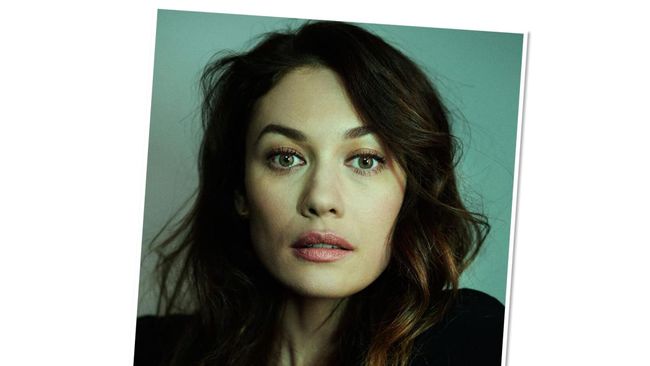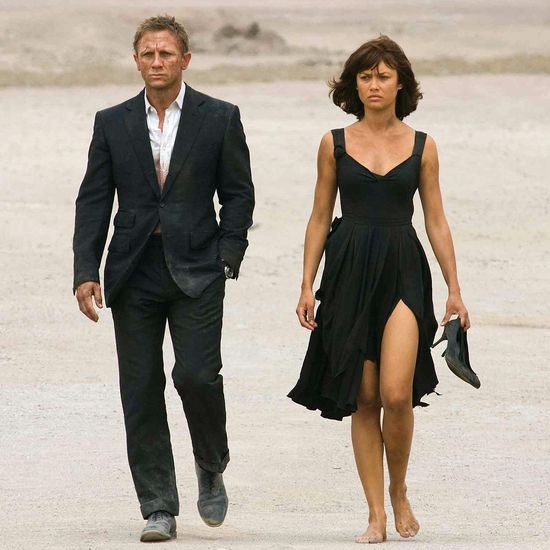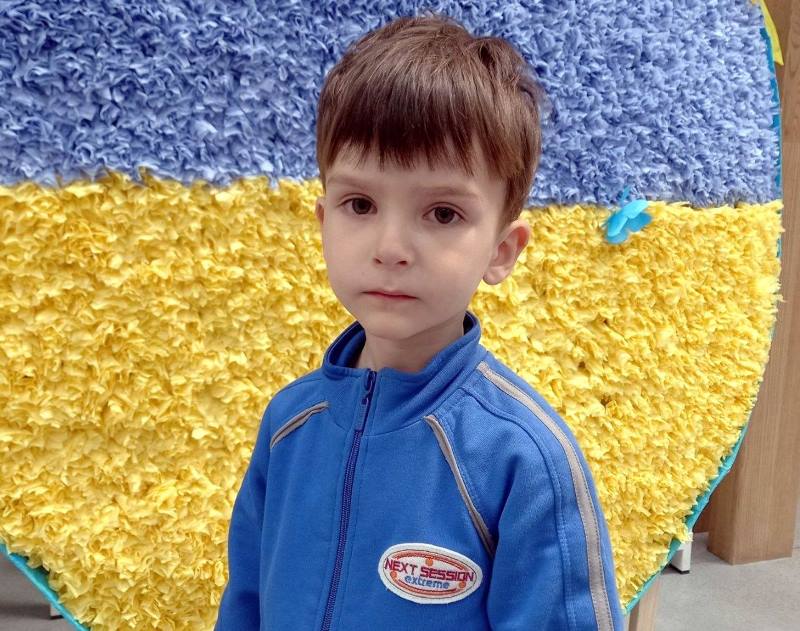
Olga Kurylenko is stressed. No, itвАЩs worse than that, sheвАЩs вАЬoverwhelmedвАЭ. The Ukrainian actress arrives late and apologetic to our Zoom call, with a curt вАЬIвАЩm OKвАЭ when I ask how she is. SheвАЩs busy, she says. Always too busy, always with too much going on. She looks around the room as though sheвАЩs already worrying about what she has to do next. Did she survive lockdown OK? вАЬLockdown?вАЭ she says, eyes wide, almost incredulous. вАЬI enjoyed lockdown! I needed to take a break. I could spend more time with my child, I could stop travelling and stay in one place. This is what I like.вАЭ
What she doesnвАЩt like, I canвАЩt help thinking, is what sheвАЩs doing right now вАУ talking to me. But as our conversation continues, I realise IвАЩve got that wrong. The 41-year-old actress talks as though she knows me, like weвАЩre friends and she wants to have a little moan about her hectic life. What I thought was curtness is something different. I think itвАЩs . . . honesty? Kurylenko is stressed because sheвАЩs on a very brief break from back-to-back filming, because sheвАЩs a single mum to her five-year-old son, Alexander, and because she works as the global ambassador for the charity Hope and Homes for Children. About that, she says: вАЬIвАЩve not done enough recently.вАЭ Adding guilt to the stress.
Not that you would know she was stressed from looking at her. Kurylenko looks like a supermodel: long, elegant limbs, ridiculous cheekbones, a very French pout (she spent much of her life in France, but now lives in London). SheвАЩs warm. She smiles a lot, and rolls her eyes and scowls and waves her hands around. SheвАЩs lovely to talk to вАУ to watch talk, actually вАУ which is probably what film directors think, judging by her schedule.

Kurylenko in 2010 visiting an orphanage in Ukraine
Kurylenko says sheвАЩs fallen back into the habit of filming non-stop вАУ four movies already this year вАУ a habit she had hoped to break during lockdown. Most famously she appeared opposite Daniel Craig as the Bond girl Camille Montes in Quantum of Solace, and has had roles in The Death of Stalin, Johnny English Strikes Again, Tom CruiseвАЩs Oblivion, and, most recently, Black Widow, the Marvel movie.
But weвАЩre here to talk about her role with Hope and Homes for Children, which works to eliminate orphanages worldwide. Orphanages were phased out in the UK and much of western Europe in the late 1980s and early 1990s. Ukraine, however, has more than 100,000 children living in 600 orphanages, Kurylenko tells me. ThatвАЩs one of the highest rates in the world. But whatвАЩs really shocking is that 92 per cent arenвАЩt orphans. They have a living parent who, with the right support, could care for them.
Kurylenko, who for the past 15 years has advocated and raised awareness for the global elimination of orphanages, isnвАЩt an orphan. Her dad вАЬwasnвАЩt aroundвАЭ, and she was raised by her mother and grandmother. But many children with similar backgrounds end up in orphanages. вАЬWe were poor; it was difficult,вАЭ she says. вАЬWhen the Soviet Union collapsed it became very tough. There was a shortage of food. My mum would cut up her clothes to make winter clothes for me.вАЭ
What she did have is love. вАЬNo one will care for you as much as your parents. Even if they make mistakes, they try their best. A stranger in an orphanage вАУ they wonвАЩt try their best.вАЭ

With Daniel Craig in Quantum of Solace
Her break came from a modelling scout when she was 14. вАЬI got so excited that I could earn some money and help my family.вАЭ She moved to Paris at 16 and sent everything she earned back home. вАЬI was like a squirrel, saving, saving, saving. I was so scared that there would be no more money. For me it was just survival. I bought myself one pair of black jeans and a yellow sweater and I wore it every single day for weeks, until an agent called me and said, вАШCan you buy something else for castings? You need to change; youвАЩve been wearing this for months.вАЩ вАЭ
Paris was a lonely time. She was вАЬnot a party girlвАЭ. Instead she stayed alone in her flat, learning French from a book. She wrote diaries because she had no one to talk to. Modelling bored her: вАЬI wanted something more. I wanted to express myself.вАЭ She took acting classes and was encouraged by her teachers to turn professional. Her gamble paid off. She has lost count of how many films sheвАЩs acted in and her work ethic hasnвАЩt diminished. вАЬIвАЩm accepting all these jobs and IвАЩm making my schedule so busy,вАЭ she says, looking around the room again. вАЬI just canвАЩt help it; itвАЩs in my nature.вАЭ
What she hasnвАЩt done in вАЬtoo longвАЭ is go to Ukraine. She became involved with Hope and Homes for Children in 2010, when the charity invited her to Kiev to visit some orphanages. вАЬI was completely ignorant. I just didnвАЩt know. I thought orphanages were good because thatвАЩs where kids are placed so they arenвАЩt on the streets and theyвАЩre taken care of.вАЭ Orphanages, she immediately realised, are not good. вАЬThey had nothing. Barely any bed sheets, not one toy, nothing on the walls. There is nothing to do and just one person looking after 30 kids. ItвАЩs like a prison. The children are alive but theyвАЩre not living.вАЭ
And then she went to the baby section. вАЬThat broke my heart.вАЭ The babies, she tells me, were left in rows of cots, with no human interaction. Some she found rocking on all fours, a sign of psychological damage. вАЬThey were rocking themselves to give comfort because no one holds them. It was terrifying. They already know that no one is there to love them.вАЭ

At London Fashion Week in September
She posts to her 775,000 Instagram followers about the issues, and has partnered with the British government to create awareness-raising short films to show the reality of orphanages, as well as encouraging UK orphanage donors and gap-year volunteers to redirect their efforts towards helping children to grow up in family environments.
Earlier this year she lobbied the Ukrainian government after it backtracked on the decision to close its state-run orphanages, and called on the EU to put pressure on Ukraine to revive its plans to develop alternative family-care services and reintegrate children into families.
Kurylenko says that the change in policy, which stipulates that вАЬvulnerableвАЭ children under three and those with disabilities (which make up 90 per cent of children in its institutions) will remain indefinitely, puts thousands of children at risk of neglect, torture, sexual abuse and trafficking.
вАЬVulnerableвАЭ, she tells me, often just means poor. In many cases, parents lack the funds and the state support to keep their child with them. A child needing physiotherapy in the UK, for example, would receive that support; in Ukraine, they are likely to be taken into care instead. And many are misdiagnosed with disabilities. вАЬThey think they are doing the right thing, that their child will be better looked after,вАЭ Kurylenko says. There have even been examples of babies being taken away from mothers who canвАЩt breastfeed. Other reasons include substance abuse, conflict, the effect of Covid and the pressures of single parenting вАУ like KurylenkoвАЩs own upbringing. вАЬI was one of the lucky ones.вАЭ
Next year, sheвАЩll be helping Hope and Homes for Children with a new campaign, partnering with Abta, the travel association, and the UK Border Force to discourage tourists from visiting orphanages abroad or volunteering in overseas orphanages.
This may be just the reason she needs to go back to Ukraine. The only problem is time: she doesnвАЩt have enough. вАЬI want to go back. I need to slow down on work, go back and see what I can do.вАЭ



